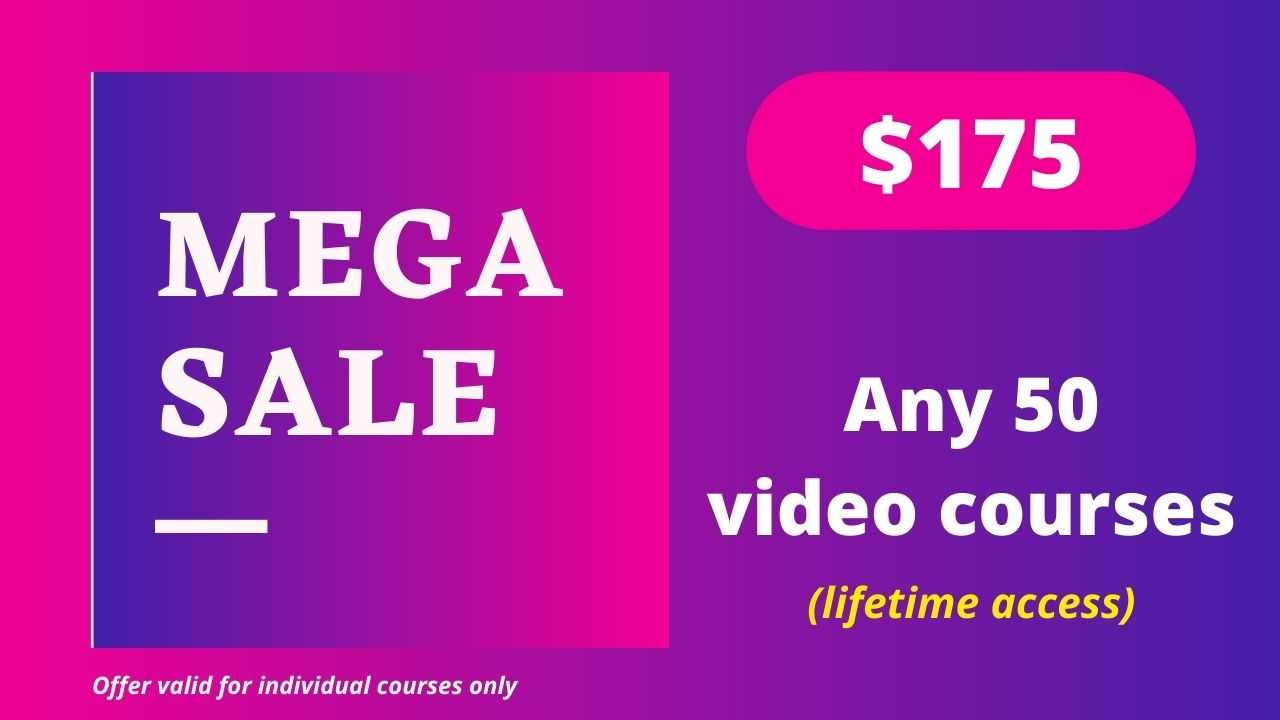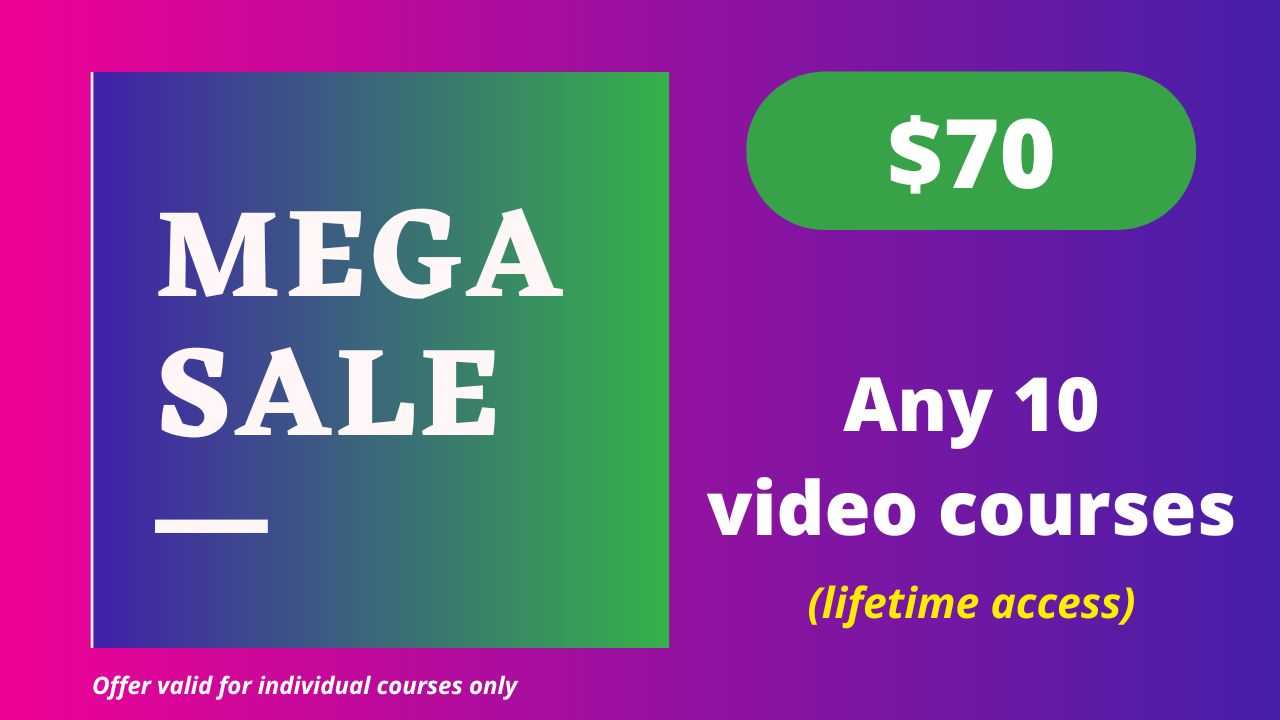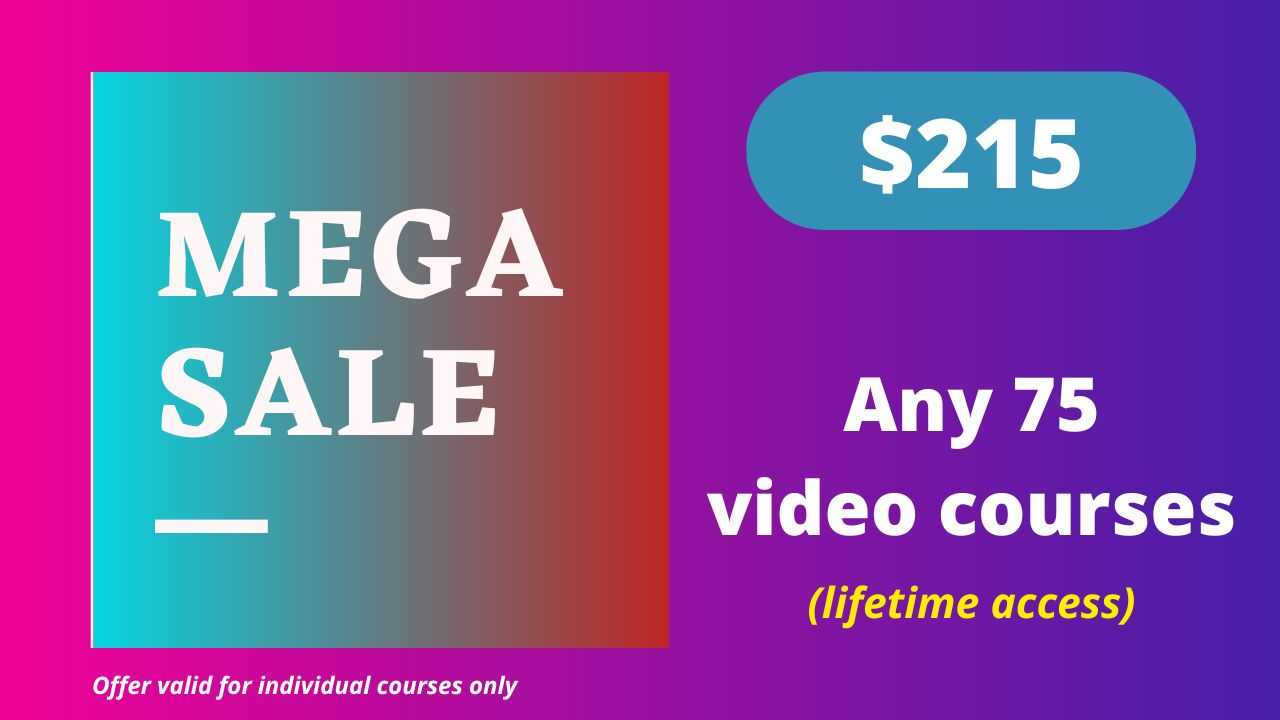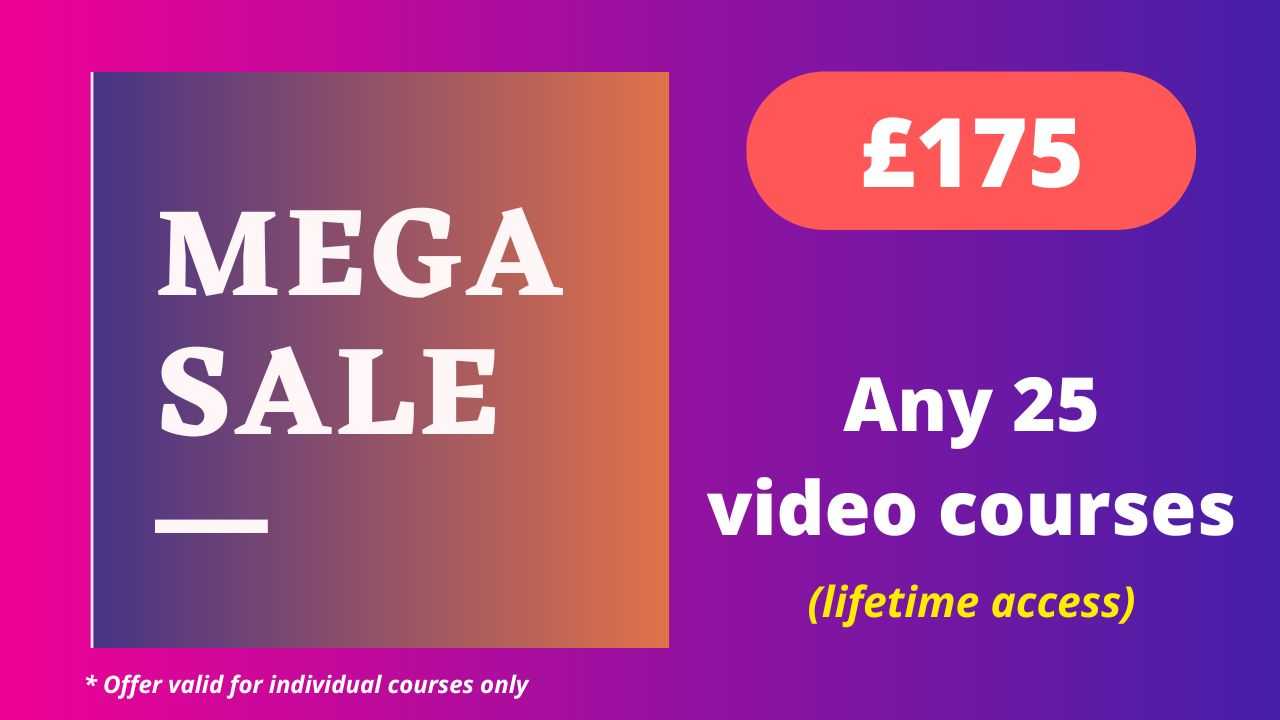Mega Sale 50 - Any 50 Video Courses with Lifetime Access
This is massive sale offer to help you enroll in any 50 courses of your choice on data, cloud, technology, ERP software, project & product management. Price Match Guarantee
Full Lifetime Access
Access on any Device
Technical Support
Secure Checkout
Course Completion Certificate
Price Match Guarantee
Full Lifetime Access
Access on any Device
Technical Support
Secure Checkout
Course Completion Certificate
 90% Started a new career
BUY THIS COURSE (
90% Started a new career
BUY THIS COURSE (USD 420 USD 2030 )-
 95% Got a pay increase and promotion
95% Got a pay increase and promotion
Students also bought -
-

- Mega Sale 10 - Any 10 Video Courses with Lifetime Access
- 300 Hours
- USD 377
- 1412 Learners
-

- Mega Sale 75 - Any 75 Video Courses with Lifetime Access
- 1500 Hours
- USD 630
- 721 Learners
-

- Mega Sale 25 - Any 25 Video Courses with Lifetime Access
- 500 Hours
- USD 245
- 1212 Learners

Uplatz launches this Mega Sale offer of 50 video courses.
You can now simply select any 50 video courses of your choice.
Access will be provided on all 50 courses for lifetime access.
Once you have selected the courses that you want, you have the flexibility to swap any course within 1 month of the purchase if you wish to.
After you have purchased this mega sale course, kindly fill up the below Google Form to let us know your choice of the courses. Uplatz team will provide you the relevant access within 24 hours.
| Google Form for your courses selection |
Note - All individual video courses are permitted under this offer. Since bundle courses and career path courses are combo of a number of courses, hence if you select a bundle or a career path course then the number of individual courses under that bundle / career path will be counted towards the total.
Some of the key technology areas covered are:
a) Automotive Engineering
b) BI Tools - Tableau, Power BI, SAS BI, etc.
c) Cloud Platforms - Microsoft Azure, AWS, Google Cloud Platform
d) Cyber Security - CISSP Certification
e) Data Analytics - Google Analytics, MS Excel, Google Sheets
f) Data Engineering
g) Data Science
h) Data Visualization with Python, R
i) Digital Marketing
j) DevOps Engineering
k) Embedded Engineering
l) Full Stack Web Development (React, Angular, Node.js, MongoDB)
m) Machine Learning & Deep Learning
n) MATLAB Programming
o) Microsoft Technologies
p) Oracle (DBA, PL/SQL, BI Publisher, Forms, APEX, WebLogic, ICS)
q) Programming - Java, JSP, Java Servlets, Python, R
r) Project Management - Fundamentals, Microsoft Project
s) Python & R
t) Salesforce
u) SAP (100 prominent functional and technical modules such as HCM, FICO, MM, PP, PM, QM, SD, S/4HANA TRM, EWM, Ariba, Hybris, GRC, BW/4HANA, S/4HANA Logistics, BW, BusinessObjects BI, Data Services, HANA, ABAP, SuccessFactors, CPI, MDG, and many more)
v) SAS
w) SEO (Search Engine Optimization)
x) ServiceNow
y) Shell Programming
z) Software Testing
aa) SQL Programming
bb) Unix & Linux
cc) Web Design - HTML5 & CSS3
Other key areas on which we have brilliant courses available:
a) Accounting & Finance
b) Leadership & Management
c) Product Management
Course/Topic - Mega Sale 50 - Any 50 Video Courses with Lifetime Access - all courses
-
Buy this mega sale offer course and then select any 5/10/25/50/75/100 video courses of your choice.
Please email to info@uplatz.com mentioning your choice.
We will then provide you access to these video courses.
Course objectives for a technology course can vary depending on the specific focus, but here are some general objectives that are often included:
-
Understanding Fundamental Concepts: Students will grasp basic technological principles, including hardware, software, networks, and systems.
-
Developing Technical Skills: Students will acquire practical skills in using various tools and technologies relevant to the course topic (e.g., programming languages, software applications, or data analysis tools).
-
Problem-Solving and Critical Thinking: Students will learn to analyze problems, design solutions, and implement effective technological strategies.
-
Applying Theoretical Knowledge: Students will apply theoretical concepts to real-world scenarios, bridging the gap between theory and practice.
-
Collaboration and Communication: Students will develop teamwork and communication skills by collaborating on projects and presenting their work.
-
Ethical and Responsible Use of Technology: Students will understand the ethical implications of technology and learn to use it responsibly.
-
Staying Current with Trends: Students will explore emerging technologies and trends, preparing them to adapt to the evolving tech landscape.
-
Project Management: Students will learn basic project management skills, including planning, executing, and evaluating technology projects.
-
Lifelong Learning: Students will cultivate a mindset of continuous learning to keep pace with rapid technological changes.
-
Interdisciplinary Applications: Students will explore how technology intersects with other fields, enhancing their ability to apply tech solutions across various disciplines.
These objectives can be tailored based on the specific technology area, such as information technology, computer science, data science, or engineering.
This course provides an overview of key technological concepts, tools, and applications in various fields. Students will gain hands-on experience and develop skills in problem-solving, collaboration, and ethical technology use.
Weekly Topics
Week 1: Introduction to Technology
-
a).Overview of technology in society
-
b).Historical developments in technology
Week 2: Hardware Fundamentals
-
a).Understanding computer components
-
b).Overview of peripherals and devices
Week 3: Software Basics
-
a).Types of software (system vs. application)
-
b).Introduction to operating systems
Week 4: Networking Concepts
-
a).Basics of networking and the internet
-
b).Understanding protocols and communication
Week 5: Programming Fundamentals
-
a).Introduction to programming languages (e.g., Python, Java)
-
b).Writing simple programs
Week 6: Data Management
-
a).Introduction to databases
-
b).Basics of data storage and retrieval
Week 7: Web Technologies
-
a).Understanding HTML, CSS, and JavaScript
-
b).Basics of web development
Week 8: Cybersecurity Principles
-
a).Importance of cybersecurity
-
b).Common threats and protection measures
Week 9: Emerging Technologies
-
a).Overview of AI, machine learning, IoT, and blockchain
-
b).Discussion of trends and future implications
Week 10: Ethical Considerations in Technology
-
a).Understanding ethical issues (privacy, security, etc.)
-
b).Responsible technology use
Week 11: Collaboration and Project Management
-
a).Tools for collaboration (e.g., Google Workspace, Trello)
-
b).Basics of project management methodologies
Week 12: Capstone Project and Presentations
-
a).Group projects showcasing learned skills
-
b).Final presentations and peer reviews
Course Requirements
-
Textbook/Readings: [List of required texts or resources]
-
Assignments: Weekly readings, quizzes, and hands-on projects
-
Exams: Midterm and final assessments
-
Projects: Group project focusing on a real-world problem
We provide 50 video courses with Certification and lifetime access ensuring you know planning, production and measurement techniques needed to stand out from the competition.
Build Complete Web and Hybrid Mobile Solutions. Master front-end web, hybrid mobile app and server-side development in three comprehensive courses.
A React frontend connected to a Node backend is a rock-solid combination for any application you want to build. This guide is designed to help you create full-stack projects with React as easily as possible. Let's see how to set up an entire project using React and Node from scratch and deploy it to the web
A full stack web developer is a person who can develop both client and server software. In addition to mastering HTML and CSS, he/she also knows how to: Program a browser (like using JavaScript, jQuery, Angular, or Vue) Program a server (like using PHP, ASP, Python, or Node)
First, we create a react app, and then for backend maintenance, we create an API in node. js and express. js which is running at a different port and our react app running at a different port. For connecting React to the database (MongoDB) we integrate through API.
Uplatz online training guarantees the participants to successfully go through the Full Stack Web Development (React, Angular, Node.js, MongoDB) Platform Certification provided by Uplatz. Uplatz provides appropriate teaching and expertise training to equip the participants for implementing the learnt concepts in an organization.
Course Completion Certificate will be awarded by Uplatz upon successful completion of the Full Stack Web Development (React, Angular, Node.js, MongoDB) Platform online course.
The Full Stack Web Development (React, Angular, Node.js, MongoDB) Platform draws an average salary of $120,000 per year depending on their knowledge and hands-on experience.
Build Complete Web and Hybrid Mobile Solutions. Master front-end web, hybrid mobile app and server-side development in three comprehensive courses.
A React frontend connected to a Node backend is a rock-solid combination for any application you want to build. This guide is designed to help you create full-stack projects with React as easily as possible. Let's see how to set up an entire project using React and Node from scratch and deploy it to the web
Note that salaries are generally higher at large companies rather than small ones. Your salary will also differ based on the market you work in.
a).Junior Full Stack Developer.
b).Frontend SDE -1.
c).Frontend Developer.
d).Software Development Engineer.
Q1.Can you explain a complex technical concept in simple terms?
Answer:
Let’s take cloud computing as an example. Think of it like renting a house instead of buying one. When you rent (cloud computing), you can use the space and utilities without worrying about maintenance or ownership costs. Similarly, in cloud computing, you can use servers, storage, and applications over the internet without needing to manage the physical hardware yourself. This allows businesses to save money and scale their resources up or down easily based on their needs.
Q2.How do you approach problem-solving in a technical context?
Answer:
I follow a systematic approach to problem-solving. First, I clearly define the problem and gather relevant information. Then, I break the problem down into smaller, manageable parts. Next, I brainstorm potential solutions and evaluate them based on feasibility and impact. After selecting the best solution, I implement it and monitor the results to ensure it resolves the issue. If needed, I iterate on the solution until the problem is fully addressed.
Q3.What programming languages are you proficient in, and which do you prefer?
Answer:
I am proficient in several programming languages, including Python, Java, and JavaScript. I prefer Python for its readability and versatility, especially for data analysis and scripting tasks. It has a rich ecosystem of libraries that simplify complex tasks. However, I choose the language based on the project requirements, as each language has its strengths suited for different applications.
Q4.Describe a project you worked on during your course and the technologies you used.
Answer:
In one of my projects, I developed a web application for managing personal finances. I used HTML, CSS, and JavaScript for the front end, creating an intuitive user interface. For the back end, I utilized Node.js with Express to handle server requests and MongoDB for data storage. This project helped me learn about full-stack development and the importance of user experience in technology solutions.
Q5.How do you prioritize tasks when working on multiple projects?
Answer:
I prioritize tasks based on deadlines, project impact, and dependencies. I use tools like Trello or Asana to create a visual representation of my tasks. Each week, I assess what needs immediate attention and adjust my priorities as needed. Communication with my team is also essential, ensuring that we are aligned on priorities and can help each other when necessary.
Q6.What emerging technology are you most excited about and why?
Answer:
I’m particularly excited about artificial intelligence and machine learning. The potential for AI to transform industries by automating processes, enhancing decision-making, and personalizing user experiences is immense. For instance, AI-driven data analysis can uncover insights from vast datasets that humans might miss. As these technologies evolve, I believe they will significantly impact our daily lives and the way we work.
Q7.How do you ensure the quality of your code?
Answer:
I ensure the quality of my code through several practices:
-
Code Reviews: I participate in peer code reviews to catch potential issues and share knowledge.
-
Unit Testing: I write unit tests to verify that individual components function as intended.
-
Documentation: I maintain clear documentation for my code, which aids in understanding and future maintenance.
-
Version Control: I use version control systems like Git to manage changes and track issues effectively.
Q8.How do you handle feedback on your work?
Answer:
I view feedback as a valuable opportunity for growth. When I receive feedback, I listen carefully and ask clarifying questions if needed. I take time to reflect on the suggestions and assess how I can apply them to improve my work. Whether the feedback is positive or constructive, I appreciate it and aim to incorporate it into my future projects to enhance my skills.









